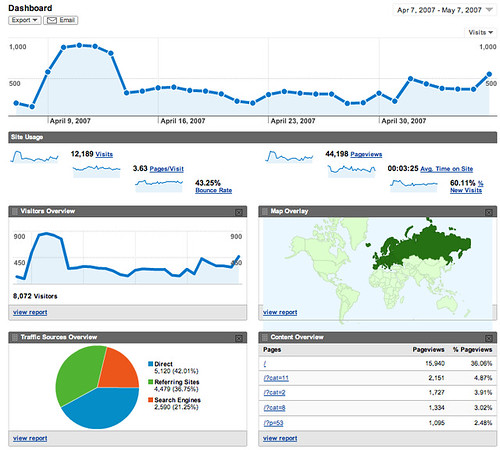… in Athens, Greece ![]()
Torrents are everywhere!
- 2007-06-13 22:06
- permalink
- 2 Comments
welcome safari to the “browser is the platform war”
So… Apple anounced yesterday the availability of Safari 3 (beta) for Windows. Why?
Step back for a moment. We are in the begining of a “browser is the platform” war. Adobe has Apollo. Microsoft is pushing Silverlight. Mozilla has not been strong on this, but XUL is a great platform to develop applications on (see Songbird and, correct me if I’m wrong, Joost).
An now Apple with Safari. You may think that Safari is “just a browser”, but I have the impression that Safari will soon be able to control the environment outside the browser. Did you see that “web2.0 addressbook-in-safari demo”? In iPhone, you can call the number you see in the browser just by clicking on it…
IF iPhone does well, then Safari 3 will be a desirable platform to develop upon. Being able to use Safari as a cross-platform (OS X, Windows, mobile) development platform ![]() will be a great asset and considering that iPhone will be closed to third party developers it may have a strong advantage.
will be a great asset and considering that iPhone will be closed to third party developers it may have a strong advantage.
- 2007-06-13 12:06
- permalink
- Comments Off
unicode fonts for ancient scripts!
George Douros created a set of Unicode fonts that cover the part of the Unicode standard for ancient scripts and symbols.
[via Mi blog lah!]
- 2007-06-06 13:06
- permalink
- Comments Off
blogging platforms + OpenID
I like the fact you can log in to LiveJournal.com using OpenID but most of all I love that you can leave comments using OpenID. OpenID is so far the best way to “sign” your comments, to prove that a comment is yours and does no belong to someone else using your name or nickname.
This is important for everyone, but in some cases it may be crucial -politicians for example. It makes the platform a safe place to be active (fake identities is a major non-starter for well known people that rely on their fame).
Using OpenID may be a bit geeky now, but services like WordPress.com are starting to provide users with OpenID accounts for free -I know AOL is doing the same thing, Microsoft’s InfoCards will make OpenID even more friendlier for Windows users (it is based on OpenID as far as I know).
- 2007-06-05 13:06
- permalink
- 4 Comments
Google buys FeedBurner
I was waiting for someone to buy FeeBurner for a long time, but since it looked one of the last really valuable web2.0 properties I expected this someone to be other than Google -Yahoo! to be honest.
But it happened: Google bought Feedburner. Wow!
Expect to see new features in Google Analytics, AdWords, and AdSense some time in the near future.
mahalo.com: wikipedia for search
Jason Calacanis of Weblogs Inc. fame anounced yesterday his latest startup Mahalo.
It’s a search engine with editor-picked results. It’s still in aplha and it may take a couple of years to get to a beta stage. (TechCrunch has all the details).
To me it looks like a wikipedia of search. It could work if Jason manages to attract a critical mass of editors. I’ll wait and see. I have the impression that Jason is betting on something else to make this thing work. A browser plugin, integration with some popular service, I don’t know. But there must be something.
(And to think that I emailed Jason a couple of days ago saying “I know how to make a better search”! -totaly different approach.)
- 2007-05-31 08:05
- permalink
- Comments Off
Google Analytics v2.0 (?)
- 2007-05-08 20:05
- permalink
- Comments Off
post-MIX07: how “open” is MS?
I spent last week at MIX07 (my photos).
The thing that impressed me most is the number of times I heard the word “open” at a Microsoft event. WTF? Is Microsoft embrassing open-* ? And if so, what? Open standards? Open Source?
I have the impression that as their “platform” evolves from the OS to Web Services (providing SLAs for Windows Live is a nice move), they realize that 1) they *can* be more open and 2) they have a lot to win by being more open.
So openness is in the Microsoft agenda. The real question is how high? I mean compared to other attributes, qualities, priorities, like “profitability”, “usabilitty”, “backwards compatibility”, etc, how high is “openness”? This is the real question.
what could a Web2.0 virus look like?
What could a web2.0 virul look like? Here is my guess:
- it will be written in Javascript
- it will live inside Google Documents
- when you open the infected document, the js will look up your Google contacts, create an infected document and invite all your contacts to collaborate on it.
- when one of the persons invited opens the infected document, the virus will replicate, and so on.
How could a virus like this be damaging?
- it could delete your mails, your documents, contacts, etc.
- it could do some URL rewriting to add a specific associate id to links to amazon and other on-line stores.
- it could launch a distributed DoS attack agains a site…
Replace Google with Microsoft Live above to get a more destructive effect.
I’m pretty sure this will happen sooner or later. And then we will start looking for the Open Web2.0 platform that has fewer virusses, etc… ![]()
JotSpot is Google now.
I don’t know if they really “needed” JotSpot (which is a great company btw), or they wanted their people, or they just wanted eliminate someone else bought a great “web office app”, but this is *very* interesting!
- 2006-10-31 21:10
- permalink
- Comments Off



